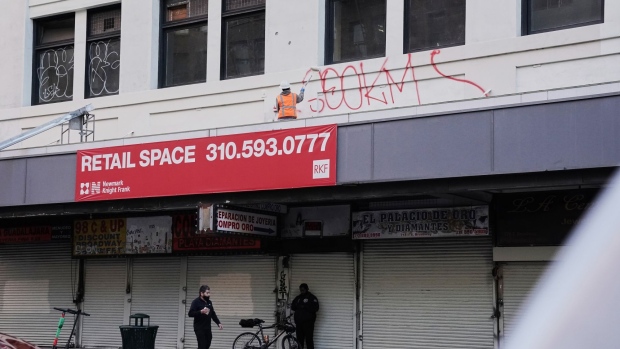Apr 1, 2022
Covid-Hit Property Loans Are Re-Defaulting to Spur Moody's Warning
, Bloomberg News

(Bloomberg) -- Troubled real estate loans for the likes of hotels and offices that saw payments get back on track after the 2020 crash are re-defaulting -- signaling more pain for commercial mortgage-bond investors.
At least 13 loans that went 60 or more days delinquent by August 2020 had resumed timely payments at some point, but then re-defaulted between last October and March. That’s according to a new study from Moody’s Analytics focused squarely on loans bundled into commercial mortgage-backed securities.
The main culprit, at least for the retail and office loans, is that commercial landlords who lost tenants during Covid are still having trouble re-leasing space, especially as businesses wait to determine their future needs and hold off on longer-term lease commitments. This will likely cause the overall CMBS delinquency rate to increase in the coming months, Moody’s said.
“There are a core group of loans that have lost tenancy that are struggling to recover,” said Moody’s Analytics researchers led by Darrell Wheeler. “This observation comes from reviewing the underlying troubled loans and finding that many loans had lease expiry challenges before March of 2020. In some cases, Covid may have hindered their leasing recoveries, as many appear to still have lower cashflows and uncertain recovery paths.”
Meanwhile, for hotel loans that re-defaulted since October, it’s still too early to find a common theme, since they all appear to be suffering from their own unique situation, Wheeler told Bloomberg. In fact, hotels overall have had a relatively swift rebound from the depths of the pandemic, and the economic recovery will likely boost their performance further, Moody’s data show.
Read more: U.S. Office Buildings Face $1.1 Trillion Obsolescence Hurdle
But the overall percentage of “troubled” CMBS loans -- defined as 60 or more days delinquent, or in forbearance -- increased from 7.78% to 7.89% in February, according to March remittance reports. Moody’s conducted the study by assessing a key credit bellwether for real estate known as the debt service coverage ratio, a measure of whether a property’s income can cover its debt.
There is some good news, however. Seventy other Covid-affected CMBS loans that were severely delinquent as of mid-2020 got their payments back on track since last October, the data show.
Yet the rate of troubled loans transitioning to performing, or paying on time, is decreasing, and “recently cured loans have weaker financials,” the study said.
Vacancy rates for office properties in the U.S. have somewhat risen in the past two years, but for CMBS conduit deals the outlook might be even worse given their exposure to certain urban markets, Barclays Capital strategists said on Monday.
Vacancy rates rose to 12.2% from 9.7%, the bank said, citing CoStar data, but in some markets like San Francisco the increase has been higher.
A 10% to 20% fall in demand for offices in the long term may imperil some CMBS loans, Barclays said.
Relative Value: CMBS
- Both corporate (IG/HY) and CMBS credit curves have steepened since the second half of 2021, Deutsche Bank CMBS strategist Ed Reardon said in a research note this week
- Overall curve steepening in both sectors is relatively muted in the context of a large spread move wider in AAA CMBS and single A corporates
- CMBS steepening has been slightly more pronounced; Single A CMBS is comparable to BB HY, Reardon said. This is consistent with CMBS subordinates being “high beta”
- Deutsche Bank thinks credit curves will bear-steepen on outflows (flatter yield curve bringing fixed income investors to shorter bonds) and growing recession risks
Quotable
Re: Fannie and Freddie raising upfront fees for second-home and high-balance loans: “I would expect to see second homes make their way into the private-label markets,” said Jeff DerGurahian, chief capital markets officer at nonbank lender loanDepot.
What’s Next?
ABS deals in the queue for next week include World Omni (auto lease ABS), Pretium Partners (single family rental), General Motors (prime auto), Firstkey Homes (single family rental), and MassMutual Asset Finance (equipment).
©2022 Bloomberg L.P.





